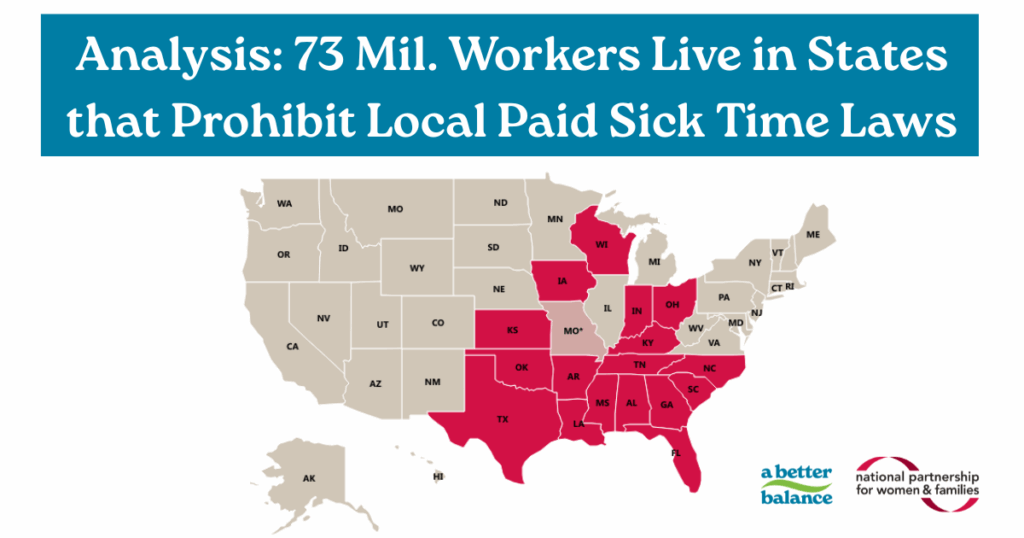Everyone gets sick, and no one should be forced to choose between their job and their health, or their family’s health. A new analysis of workers’ access to paid sick days finds lawmakers in 18 states across the country not only fail to guarantee that workers can earn paid sick days—they also prohibit local governments from setting their own standards around paid sick time.
Altogether, nearly 73 million workers — 43 percent of the U.S. labor force — live in these 18 states, which ban cities, towns, and counties from passing basic paid sick time laws—even when communities want them. The new data from A Better Balance and the National Partnership for Women & Families also finds:
- More than 71 percent of workers in these states with laws “preempting,” or banning, local paid sick time protections live in the South.
- Over half (56 percent) of the Black labor force in the United States lives in one of these 18 states.
- More than half of the rural labor force in the country lives in one of these states.
- A total of 23.4 million working parents and 5.5 million disabled workers live in one of these states.
- More than 10.3 million young workers, who are less likely to have access to paid sick leave through their jobs, live in one of these states.
Paid sick days laws help people and communities stay healthy and keep parents at work. In recent years, many cities, counties and states have passed paid sick leave laws that support both workers and the economy. Voters across the nation have also passed paid sick time policies via ballot initiatives by large margins and with strong bipartisan support.
“Access to paid sick time is a critical matter of racial, gender, and economic justice,” said Inimai Chettiar, President of A Better Balance. “State laws that block paid sick time policies across the South deprive local communities of the ability to pass this commonsense workplace protection and exacerbate existing inequities in the region, particularly for women of color and workers in low-wage jobs. No one should be forced to choose between a day’s pay, and staying home to recover from illness or care for a sick child.”
“It’s inevitable that everyone will get sick at some point, and everyone deserves to be able to take time off work to recover or care for their sick loved ones,” said Sharita Gruberg, vice president for economic justice at the National Partnership for Women & Families. “Women work hard for their families doing the majority of unpaid caregiving but many can’t afford for themselves or their loved ones to get sick. The lack of access to paid sick days particularly undermines our health and job security. So it’s simple: paid sick time should be a basic benefit for every worker, and no one should have to make the impossible choice between staying home to take care of themselves, or being forced to go to work while sick or injured.”
Despite growing momentum and evidence pointing to the importance of paid sick time, policymakers in the 18 states highlighted in this report—concentrated in the South and Midwest—have made policy choices that have interfered with local decision-making power.

